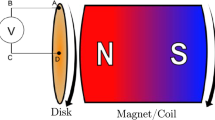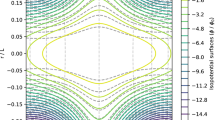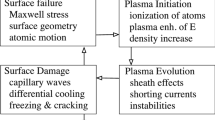Abstract
EXPERIMENTS carried out in this Laboratory have suggested that the movement of an arc between metal electrodes in a transverse magnetic field is determined by the motion of the cathode root.
This is a preview of subscription content, access via your institution
Access options
Subscribe to this journal
Receive 51 print issues and online access
$199.00 per year
only $3.90 per issue
Buy this article
- Purchase on Springer Link
- Instant access to full article PDF
Prices may be subject to local taxes which are calculated during checkout
Similar content being viewed by others
References
Guile, A. E., and Mehta, S. F., Proc. Inst. Elect. Eng., 104, A, 533 (1957).
Guile, A. E., Lewis, T. J., and Mehta, S. F., Brit. J. App. Phys., 8, 444 (1957).
Eidinger, A., and Rieder, W., Arch. Elektrotech., 43, 94 (1957).
Babakov, N. A., Elektrichestvo, 7, 74 (1948).
Winsor, L. P., and Lee, T. H., Trans. Amer. Inst. Ele ct. Eng., 75, 143 (1956).
Author information
Authors and Affiliations
Rights and permissions
About this article
Cite this article
SECKER, P., GUILE, A. Magnetic Deflexion of Arcs. Nature 181, 1615–1616 (1958). https://doi.org/10.1038/1811615a0
Issue Date:
DOI: https://doi.org/10.1038/1811615a0
Comments
By submitting a comment you agree to abide by our Terms and Community Guidelines. If you find something abusive or that does not comply with our terms or guidelines please flag it as inappropriate.



